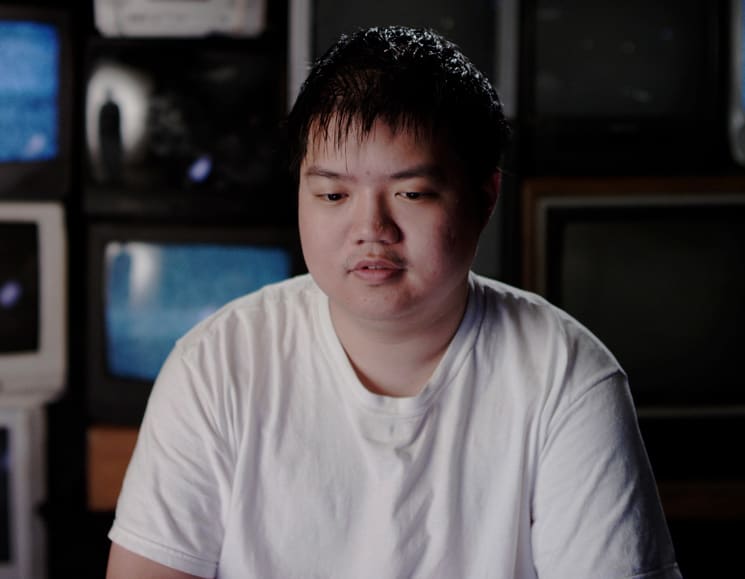Who is Arthur Chu? is a deeply personal documentary. While it deals with very in-vogue themes, it is committed to telling the story of one man's quest to become comfortable with his identity, forged while navigating toxic masculinity, racism and nerd culture.
Arthur Chu's name may be familiar to those entrenched in social justice circles online, but his initial rise to fame — and the beginning of his ongoing battle with Twitter trolls — began with Jeopardy (hence the film's tongue-in-cheek title). As a contestant, Chu's 11-game winning streak was an unpopular one. His strategic approach to gameplay was construed as "taking advantage" of the system, and his competitive attitude came across as cocky and obnoxious, as well as one that didn't fit with the Asian-American "model minority" stereotype. Twitter retaliated in full force, taking aim at Chu's appearance and heritage.
As a result, Chu began to think about how he could use his newfound celebrity, as well as his past frustrations as a socially awkward nerd, to speak to this audience on their own level about their harmful attitudes. Written as a response to the Isla Vista shootings, Chu's most well-known online piece is a scathing look at a culture that tells young, lonely men that women are prizes to be won — but it comes from a place of commiseration. Chu used to be one of these guys, and he knows what it feels like to assume that you "deserve" a girl just because you're a nice guy.
The film also explores Chu's discomfort with his Asian-American identity, and his writing for The Daily Beast and Salon also challenges depictions of race in the media. As we follow Chu, we begin to get the sense that his writing and social media presence as an advocate for anti-misogyny, anti-racism, and anti-cyberbullying are therapeutic for him as well. He speaks at length about feeling like an outsider, both as an Asian-American among whites as well as within his own Asian-American circle, and his efforts to encourage others to think critically about the spaces Asian-Americans and other people of colour occupy within society in turn help him find his own sense of place. "This is not your country," is a statement made by Chu's immigrant father on his family's place in America. It's a statement that Chu reflects in his piece on race in the wake of George Zimmerman's acquittal of the murder of Trayvon Martin.
Throughout the film, the directors focus on Chu as he learns to become just as comfortable with his speaking engagements and online activism as he is with his family, both with his wife Eliza, who struggles with a physical disability and her own creative endeavours, as well Chu's Taiwanese parents and extended family. While some of these scenes tend to teeter on the overlong side, and the film ends without much of a conclusion, it's a thought-provoking and reflective look at disrupting the status quo. Here, we see a journey from angry social outcast to activist and advocate.
(Independent)Arthur Chu's name may be familiar to those entrenched in social justice circles online, but his initial rise to fame — and the beginning of his ongoing battle with Twitter trolls — began with Jeopardy (hence the film's tongue-in-cheek title). As a contestant, Chu's 11-game winning streak was an unpopular one. His strategic approach to gameplay was construed as "taking advantage" of the system, and his competitive attitude came across as cocky and obnoxious, as well as one that didn't fit with the Asian-American "model minority" stereotype. Twitter retaliated in full force, taking aim at Chu's appearance and heritage.
As a result, Chu began to think about how he could use his newfound celebrity, as well as his past frustrations as a socially awkward nerd, to speak to this audience on their own level about their harmful attitudes. Written as a response to the Isla Vista shootings, Chu's most well-known online piece is a scathing look at a culture that tells young, lonely men that women are prizes to be won — but it comes from a place of commiseration. Chu used to be one of these guys, and he knows what it feels like to assume that you "deserve" a girl just because you're a nice guy.
The film also explores Chu's discomfort with his Asian-American identity, and his writing for The Daily Beast and Salon also challenges depictions of race in the media. As we follow Chu, we begin to get the sense that his writing and social media presence as an advocate for anti-misogyny, anti-racism, and anti-cyberbullying are therapeutic for him as well. He speaks at length about feeling like an outsider, both as an Asian-American among whites as well as within his own Asian-American circle, and his efforts to encourage others to think critically about the spaces Asian-Americans and other people of colour occupy within society in turn help him find his own sense of place. "This is not your country," is a statement made by Chu's immigrant father on his family's place in America. It's a statement that Chu reflects in his piece on race in the wake of George Zimmerman's acquittal of the murder of Trayvon Martin.
Throughout the film, the directors focus on Chu as he learns to become just as comfortable with his speaking engagements and online activism as he is with his family, both with his wife Eliza, who struggles with a physical disability and her own creative endeavours, as well Chu's Taiwanese parents and extended family. While some of these scenes tend to teeter on the overlong side, and the film ends without much of a conclusion, it's a thought-provoking and reflective look at disrupting the status quo. Here, we see a journey from angry social outcast to activist and advocate.
